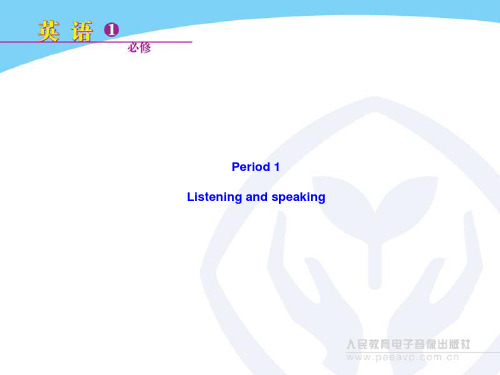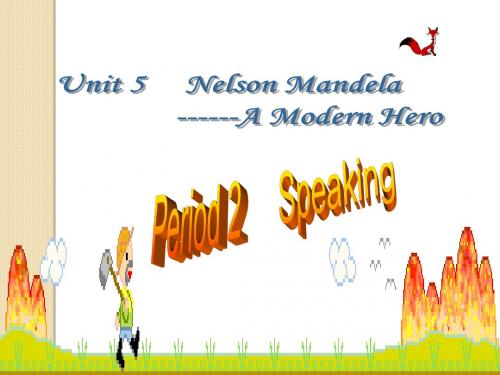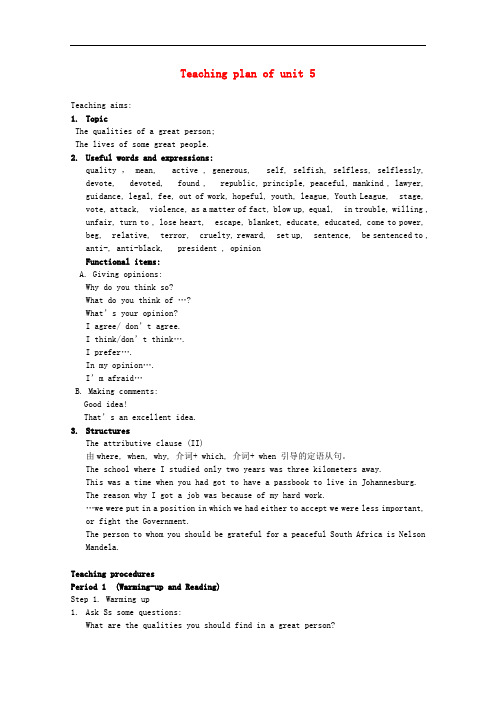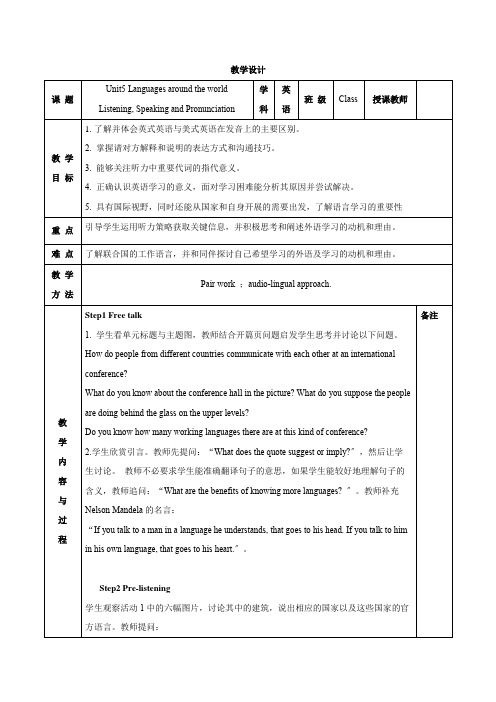浙江省高中英语 unit5 Speaking教案 新人教版必修1
- 格式:doc
- 大小:93.00 KB
- 文档页数:2




Teaching plan of unit 5Teaching aims:1.TopicThe qualities of a great person;The lives of some great people.eful words and expressions:quality , mean, active , generous, self, selfish, selfless, selflessly, devote, devoted, found , republic, principle, peaceful, mankind , lawyer, guidance, legal, fee, out of work, hopeful, youth, league, Youth League, stage, vote, attack, violence, as a matter of fact, blow up, equal, in trouble, willing , unfair, turn to , lose heart, escape, blanket, educate, educated, come to power, beg, relative, terror, cruelty, reward, set up, sentence, be sentenced to , anti-, anti-black, president , opinionFunctional items:A. Giving opinions:Why do you think so?What do you think of …?What’s your opinion?I agree/ don’t agree.I think/don’t think….I prefer….In my opinion….I’m afraid…B. Making comments:Good idea!That’s an excellent idea.3.StructuresThe attributive clause (II)由where, when, why, 介词+ which, 介词+ when 引导的定语从句。


教学设计What countries do the pictures stand for? What official languages are spoken in these countries?教学提示:除了活动中提到的国家及相应的官方语言,教师补充,例如:China—Chinese、Japan—Japanese、Egypt—Arabic、Denmark—Danish、New Zealand—English and Maori、Brazil—Portuguese,补充的词汇可以包含活动1中未出现、但在听力中会出现的国家及其官方语言的名称。
教师在此环节也可提示学生,有些国家的语言与殖民地等历史原因有关。
Step3 While-listening(1)学生首先熟悉活动2中表示语言的单词,然后教师播放录音,让学生听并完成活动2。
教师还可以让学生根据构词法说出这些单词所对应的国家名称,例如:Russian—Russia、Danish—Denmark。
〔2〕学生阅读活动3中的第二至第四个问题,猜想billion、native、attitude的意思。
教学提示:教师不一定要求学生猜出这些单词确切的意思,但可以让学生依据它们在句中的前后联系,充分发挥联想,例如:billion 前有how many,可能与数量有关;native language 后有second language,对应的可能是first language; attitude 后有towards,可能是“看法〞之类的意思。
〔3〕学生根据从第一遍录音中听到的信息,答复活动3中的问题。
教师播放第二遍录音,让学生边听边核对答案。
之后师生核对答案。
〔4〕教师举例说明代词的指代用法,让学生熟悉活动4中的两个句子,尤其是句中的代词。
之后教师播放第三遍录音,让学生听并提醒学生关注这些代词前面出现的名词,最后要求他们说出这些代词在听力文本中分别指代什么。
UNIT 5 LANGUAGES AROUND THE WORLD主题语境人与社会——语言学习背景导入:世界语言有几千种,但主要的语言有二十多种。
而联合国的工作语言只有六种:英语、汉语、西班牙语、俄语、阿拉伯语和法语。
作为中国学生你了解汉语书写体系和汉字演化过程吗?你懂得为什么人们要学外语吗?让我们一起学习和探索相关内容吧!Neither Pine nor Apple in PineappleHave you ever asked yourself why people often have trouble learning English?I hadn't,until one day my fiveyearold son asked me whether there was ham in a hamburger.There isn't.This made me realize that there's no egg in eggplant either.Neither is there pine nor apple in pineapple.This got me thinking how English can be a crazy language to learn.For example,in our free time we can sculpt a sculpture and paint a painting,but we take a photo.And when we are traveling we say that we are in the car or the taxi,but on the train or bus! While we're doing all this traveling,we can get seasick ① at sea,airsick① in the air and carsick① in a car,but we don't get homesick②when we get back home.And speaking of home,why aren't homework and housework the same thing?If “hard” is the opposite③ of “soft”,why are “hardly” and “softly” not an opposing pair? If harmless actions are the opposite of harmful actions,why are shameless④ and shameful⑤ behaviors the same?When we look out of the window and see rain or snow,we can say “it's raining”or “it's snowing”.But when we see sunshine,we can't say “it's sunshining”.Even the smallest words can be confusing.When you see the capitalized(大写的)“WHO” in a medical report,do you read it as the “who” in “Who's that?”What about “IT” and “US”?You also have to wonder at the unique madness of a language in which a house can burn up as it burns down,in which you fill in a form by filling it out,and in which an alarm is only heard once it goes off!English was invented by people,not computers,and it reflects⑥ the creativity of the human race.That is why when the stars are out , they are visible , but when the lights are out , they are invisible. And that is why when I wind up my watch,it starts,but when I wind up this passage,it ends.(选自外研版新教材必修第一册 Unit 2)【词汇积累】①seasick/airsick/carsick /'siːsɪk//'eəsɪk//'kɑːsɪk/ adj.晕船的/晕机的/晕车的②homesick/'həʊmˌsɪk/ adj.想家的,患思乡病的③opposite/'ɒpəzɪt/ adj.对面的;截然相反的n.对立面,对立的人(或物)④shameless/'ʃeɪmləs/ adj.无耻的;不要脸的⑤shameful/'ʃeɪmfl/ adj.可耻的;丢脸的⑥reflect/rɪ'flekt/ v.照出(影像);反映;反射;沉思;显示【靓句背诵】1.This made me realize that there's no egg in eggplant either. Neither is there pine nor apple in pineapple.这让我意识到eggplant(茄子)里也没有egg(鸡蛋)。
Period 3. Speaking
Step 1. Revision
Dictation: The teacher speaks the following sentences in Chinese, the Ss write them down in English.
1.The time when I first met Nelson Mandela was a very difficult period of my life.
2.He offered guidance to poor black people on their legal problems.
3.I worried about whether I would become out of work.
4.We were put into a position in which we had either to accept we were less important,
or fight the Government.
5.It was very dangerous because if I was caught I could be put in prison.
6.I knew it would help us achieve our dream of making black and white people equal.
Step 2. Talking
1.Ss answer the question:
What are the qualities you should find in a great person?
2.Ss in groups talk about their heroes on page 69. When they discuss, try to use
the following words:
Good idea!
That’s an excellent idea!
I agree/ do n’t agree.
I prefer…
In my opinion…
I think/don’t think…
I’m afraid…
Who is your hero?
Did he do anything for others?
Why do you think so?
Why do you like him so much?
What are/ were his best qualities?
What do you think of …?
What’s your opinion?
Step 3. Speaking task
Ss in groups and try to finish the speaking task on page 73.
1.Ss read the passage and get to know what they are go to do;
2.Ss in groups and begin to discuss;
3.Ss should take notes while they are talking;
4.Ss should choose one to give a talk to the class.
5.
Step 4. Debating
Ss divide into two parts and debate.
Topic: Mao Zedong is a great person in history.
Mao Zedong is not a great person in history.。